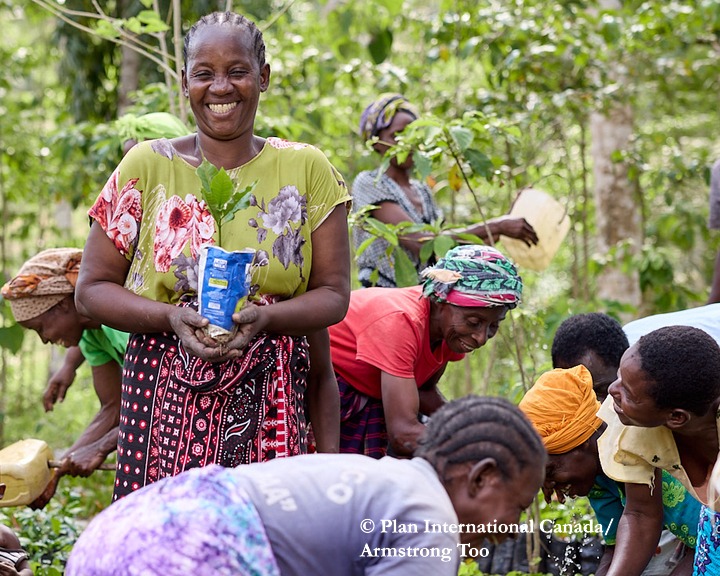Conservation and Sustainable Management of Coastal and Marine Ecosystems, by Plan International Canada
Project Information
The Conservation and Sustainable Management of Coastal and Marine Ecosystems (COSME) project aims to expand Plan International Kenya’s women-led, climate-resilient livelihoods and coastal management efforts in Kwale and Kilifi counties. In partnership with the Jane Goodall Institute Canada, COSME will facilitate South-South learning among cross-border communities in Kenya and Tanzania’s marine and coastal forest regions. The project will implement three interconnected nature-based solutions for climate adaptation and biodiversity conservation: mangrove restoration, sustainable seaweed farming, and locally-led forest management. Additionally, small-scale conservation agriculture practices will be introduced to enhance the resilience of women in the targeted communities.
The project aims to foster climate-resilient and equitable economies in communities reliant on coastal and marine ecosystems in Kenya’s coast region, with a focus on benefiting women. It seeks to enhance the adoption of gender-responsive and socially inclusive nature-based solutions (NbS) for climate change adaptation, which also support biodiversity and ecosystem integrity.
The initiative aims to empower women in all their diversity, enabling them to exercise their rights to gender-responsive NbS, thereby increasing adaptation and resilience. Additionally, it focuses on improving governance structures to be more gender-responsive and child/youth-friendly, promoting climate adaptation, resilience, and biodiversity.
This project focuses on capacity building and field implementation to improve climate resilience in coastal communities. Key outputs include conducting biodiversity and climate risk assessments, and developing a business case for carbon-based payment for ecosystem services through mangrove restoration.
Members of mangrove groups, predominantly women, receive training and coaching in mangrove restoration, conservation, and value addition, linked with financial services and high-value markets. Gendered market assessments and research into improved seaweed varietals are conducted, with women-led cooperatives receiving training and connections to export markets.
Local communities, especially women, are trained in gender-responsive forest management and community-centred conservation, piloting nature-based solutions. Training for women covers green life skills, climate change, economic rights, sexual and reproductive health rights (SRHR), and gender equality and inclusion (GE&I).
Gender-transformative household action plans are developed for climate change adaptation and women’s rights, while solar and improved technology solutions are distributed to reduce fuelwood harvesting and improve air quality. Women’s groups are trained in conservation agriculture to enhance nutrition and diversify livelihoods, with innovative clean water solutions provided to schools.
A community-level social and behaviour change communication (SBCC) strategy addresses gender-responsive climate change and women’s rights. Children and youth receive training on climate change and JGI’s Roots & Shoots methodology, with community-level conservation management and adaptation plans developed.
Communities are connected to climate action funding opportunities for locally-led adaptation efforts. A national/regional event shares lessons and strategies for climate resilience and nature-based solutions. Evidence on the benefits of NbS is disseminated to support advocacy efforts by county governments, KCIC, and women’s and youth-led organisations.

Project Data
JGI and Cascadia Seaweed.
Implementation Countries
News & Stories
Plan International Canada, 05/12/2025
Female-led conservation group fighting deforestation in Kenya’s Sacred Mijikenda Kaya Forests

